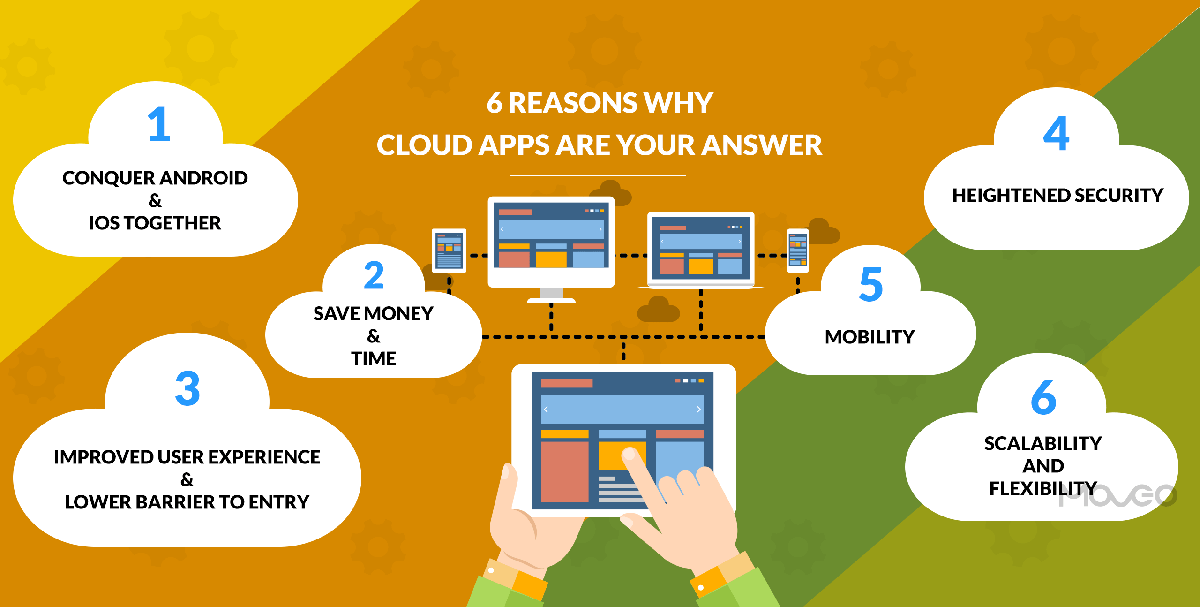Enterprises are quickly realizing that cloud computing is the future of app development. According to a survey by IDC, 60 to 70% of all IT enterprises will make major investments in cloud-based solutions. In fact, to quote IDC:
Cloud as we know it is on a path of transformation. IDC predicts that by 2020, public IT cloud services will account for 58% of the $355 billion combined spending on traditional plus public cloud applications, development and deployment tools, infrastructure software, storage, and servers.
With a potential so high, there is no way app development can stay far behind. Cloud-based mobile apps have some significant advantages offer traditional native app development.
So here are 6 reasons you need to start taking enterprise apps seriously today, and revolutionize your app development results:
1. Conquer Android & ios Together
Developing a native app for both platforms is truly like developing two apps. You simply cannot avoid doing double the work. Moreover, since it is obviously difficult to complete both the iOS and Android apps together, at the same time, most businesses end up launching on one platform before the other. So right when your launch efforts are at the highest, your campaigns are working their magic and users on one platform are fresh off the boat sharing and spreading the word, your users on the other platform, who probably heard about you from their friends, are completely missing out on the action. It’s quite possible that by the time you launch on the second platform, the buzz has cooled.
Cloud apps, unlike their native counterparts, reside on the web and can be accessed from any platform. So you can launch on both platforms simultaneously and target all of your audience together. No more double the work, no more lost users.
2. Save Money and Time
Now there’s a winner. We’re all looking for a way to pack in maximum efficiency while reducing costs as much as we can. Cloud-based apps help you do just that. While a lot of businesses fear that the initial cost of implementing a cloud-based server will run up a huge bill, you need to consider more than just the cost upfront. Cloud-based apps will always give you a higher return on your investment, paying for themselves many times over in due course.
First of all, cloud apps are faster to develop. Since you develop for Android and iOS together, you can greatly cut down the developmental cost. This helps startups save time and money while developing their apps on a shoestring budget as well as enterprises looking to work on tighter deadlines.
3. Improved User Experience and Lower Barrier to Entry
Since cloud based apps can be accessed directly from the web, they don’t need to be installed on the user’s phone. This breaks down one of the major barriers to entry that native apps face. With native apps, user browses the app store, checks out the app, looks at its size, considers using up that much storage, chooses to click the install button and wait for the app to be downloaded, installed and onboarded before they can do anything with the app. Now that’s a really long way to go.
Cloud based apps on the other hand take up zero to minimal space on a user’s phone. They are super easy to access with no wait time and hence, users feel far less hesitation before giving them a shot. This helps you lower the barriers and get a quicker chance to show your users what you have. Consequently, cloud based apps feel faster when the user begins using them, provide a better onboarding experience and greatly improve engagement.
4. Heightened Security
Contrary to popular misconception, cloud-based apps are extremely safe and secure. A number of people feel that if their data is stored in the cloud and can easily be accessed from anywhere on any device, it must be rather unsecure. However, be assured that data stored in the cloud is secured using the highest protocols. A cloud host personally handles the security of the cloud as opposed to in-house IT teams that have to multitask and divide their attention among a myriad of activities. Also, unfortunately internal leakage cannot be ruled out as a top concern in data theft, as much as we like to think otherwise. So keeping data off-site prevents internal data theft and makes your application more secure. According to RapidScale, 94% of businesses saw significant improvement in their data security after switching to the cloud. Switching to the cloud also makes it easier for enterprises to comply with government policies.
5. Mobility
The undisputed and most obvious advantage of cloud based apps is mobility. They can be accessed from any device anywhere, allowing enterprises to enhance mobility and increase productivity. By not tying up employees to specific devices, enterprises can boast of a richer work from home and work while you travel culture, becoming much more productive and effective.
6. Scalability and Flexibility
As you work hard to grow your business and revenue, you have to divide your attention between a number of different responsibilities. Hosting, storing data, managing bandwidth and a myriad of other preoccupations can be overwhelming and take bite off your productive time.
With cloud apps, your hosting service does all the aforementioned tasks for you, leaving you free to grow your business. In an Information Week survey, 65% of respondents agreed that ‘the ability to meet business demands’ is the biggest reason businesses should adopt a cloud environment.
Conclusion
The above reasons aren’t the only reasons cloud apps are the next big thing. Mobile users need increased flexibility, security and ease of access. Enterprises need solutions that are faster, cheaper and more secure against data breaches. Cloud apps solve all these problems, while providing a clean, smooth and delightful user experience. So if you are in the mood to try something better than the good old native development, it’s probably time to get your feet wet in cloud app development. If so, drop us a line and we could explore possibilities to get your business cloud ready and take a plunge into the future.


